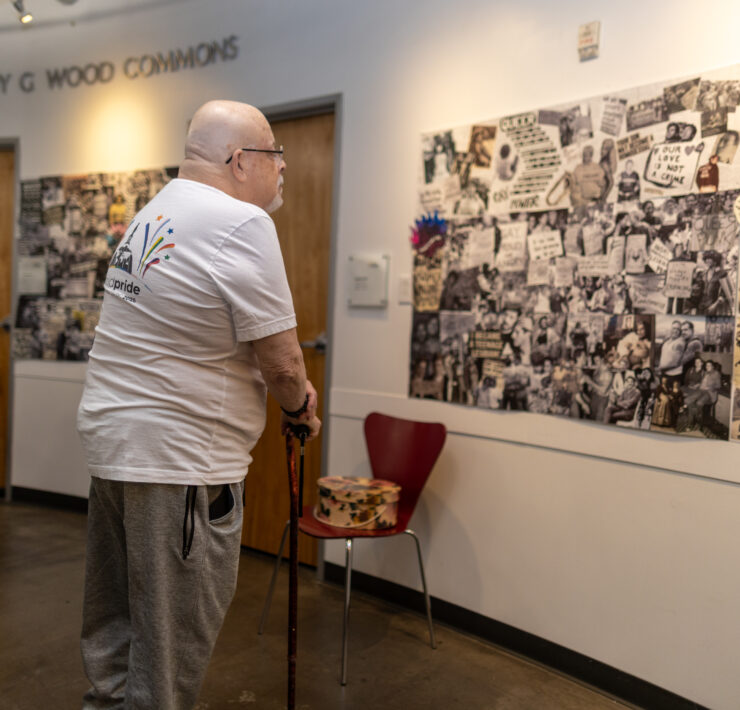HELLO HOMO: Let’s Go to Therapy!

Hello Homo!
I need a therapist! It is so hard and exhausting to find one, let alone someone good at working with LGBTQ+ people. I’ve tried Google and asking friends; I’ve tried the mental health apps, too. Therapists I want to work with are not taking new clients or are too expensive, or the ones I can afford and can see me don’t know about LGBTQ+ issues. How can I find a therapist?
-Corey in City Park.
Hello Corey!
I GET IT! This is a topic I have written about for other publications at length. It is hard to find a therapist, let alone someone who fits what you need.
Any therapist can advertise to LGBTQ+ clients, and there really isn’t a hard and fast way to know if a therapist is equipped to work with LGBTQ+ clients or your specific experiences of queerness.
It’s getting better, and fortunately, here in Denver, we have accessible LGBTQ+-centered mental health services!
-
- Glass Lawler Mental Health at The Center on Colfax has collaborated with Denver Health Mental Health Services to provide LGBTQ+-specialized therapy. I can attest that the therapists there are very skilled at serving our community. Their website advertises that they offer 12 free therapy sessions.
- Denver Element provides LGBTQ+ recovery-centered treatment through 1:1 therapy, therapy groups, and social groups. It can be so hard to find LGBTQ+ safe recovery spaces and treatment. If you are LGBTQ+ and struggling with addiction and/or living with HIV, they have great resources and support available. Element is my go-to referral for community members, friends, and clients seeking substance-related support. They accept Ryan White funding, Medicaid, and sliding scale.
- The Transgender Center of the Rockies is another amazing resource. Currently, there is a waitlist for individual therapy. If you are not in a position to wait, they have a robust list of referrals of trusted gender-competent therapy referrals. TCR currently has room in its many groups, such as an emotional regulation skills building group, gender euphoria group, eating disorder support group, and substance use intervention group. Like Element, TRC offers social and community events every month. TCR currently accepts Medicaid and offers a sliding scale fee that will be reviewed during the intake to meet your financial needs.
These are trusted agencies for mental health support because serving LGBTQ+ people is the core of their missions. Outside of agencies like these requires a bit more work on your end.
Envision: You provide LGBTQ+-specialized mental health training to therapists and providers across the state. They are actively shaping the mental health landscape for queer people here in Colorado. It’s very exciting!
So it is getting better, but unfortunately, you, the person seeking a therapist, still have a lot of responsibility to make sure any therapist is a good fit for you. Knowing the difference between therapists who advertise themselves as LGBTQ+ Friendly, Affirming, or Specialized is key!
Differentiating
Friendly
Honestly, I raise my eyebrow when I see therapists advertise that they are “LGBTQ+-friendly.” It suggests a sense of tolerance rather than understanding. Anyone can say that they’re LGBTQ+-friendly, but that doesn’t mean they’re truly informed on how you walk through the world. “Friendly” could mean anything. For instance, a therapist could be personally right-wing, evangelical, or hold other cis-het-patriarchal ideologies and not understand how those personal values conflict with the mental health needs of LGBTQ+ clients. They could still advertise that they are LGBTQ+ “friendly” for marketability and profitability. Unfortunately, this happens a lot.
Affirming
LGBTQ+-affirming therapy is a better bet because “affirming” typically means that the therapist has a shared experience within LGBTQ+ communities or possibly a strong sense of allyship. Affirming therapy can also mean that the therapist is committed to participating in social justice for LGBTQ+ folks in some way. Affirming therapists often means the therapists include queer theory in their practice and are educated on LGBTQ+ psychology.
Specialized
I recommend (when possible) seeking an LGBTQ+-specialized therapist. It is a safe bet that any of the therapists at the above-listed agencies are specialized and dedicated to working with our communities.
Specialized means that their education and training were selected and completed for LGBTQ+-oriented mental health considerations. Some graduate schools offer an LGBTQ+ specialization, which requires a consistent focus on LGBTQ+ considerations throughout the two-year program. Similarly, some mental health agencies provide a standardized 65-hour initial training on LGBTQ+ mental health considerations, interventions, and theory, along with a year-long supervision program provided by LGBTQ+ experts.
Other forms of specialization can be documented training, research, and consultations. Overall, “specialized” means the therapist’s career is dedicated to LGBTQ+ mental health.
Searching
Here are a few tips to help your search. If you are going to the private practice route, I suggest using Psychology Today to search for a therapist. Filtering therapists is essential. With therapist search engines like Psychology Today, you can get specific, and I suggest you do. Some basic but essential search filters include:
-
- City and state
- Gender
- Race
- Specialties (like addiction, gender identity, sex therapy, sex-positive, non-monogamy) There isn’t a specific LGBTQ+ filter in Psychology Today, but selecting filters related to or common in LGBTQ+ culture will land you more within the rainbow.
- Sexual Orientation This is a critical filter to turn on.
- In-person/ video therapy is up to you.
- Price and insurance – Be realistic with what you can afford every week.
Then, start weeding through the therapists. It’s better to begin overly specific and loosen your search than to read and call dozens of therapists. Finding a therapist is a lot like dating. You need to feel it out before committing. Most therapists offer a free 15-to 20-minute consultation (if they don’t, that could be a red flag) to get a feel for each other before committing to an intake session and treatment. I suggest interviewing at least three therapists before moving forward with one.
Vet the Hell Out of Them
In a consultation, ask all your questions. Have them written down beforehand and in front of you when you first meet with the therapist/s. It is a two-way interview. In addition to the personal questions, asking these questions is often helpful:
-
- Where does their experience with LGBTQ+ mental health originate from?
- What LGBTQ+ education, certifications, and training have they completed?
- What relationship do they have with the LGBTQ+ community?
- How do they identify?
- Why do they like working with LGBTQ+ clients?
Don’t be afraid to ask the questions that are important to you. Your relationship with a therapist is important, vulnerable, and special. Before committing, ensure you are comfortable and confident with the therapist and that it is the right fit. Trust your internal instincts about this and vet them well so you can fully commit to a therapeutic process that is right for you.
I hope this information was helpful, OFM reader.
Have a question you would like answered? Submit your questions directly to me at hellohomo@ofm.media Follow me on Instagram @holistic.homosexual for weekly updates and links to each new post on OFM.
Disclaimer: Hello Homo is for informational and educational purposes and is not a substitute for mental health treatment. Hello Homo (Jesse Proia) is not providing mental health advice, diagnosis, or treatment to readers. If you are someone you know is experience a mental health crisis or emergency, please contact 911, 988, or go to the nearest emergency room.









